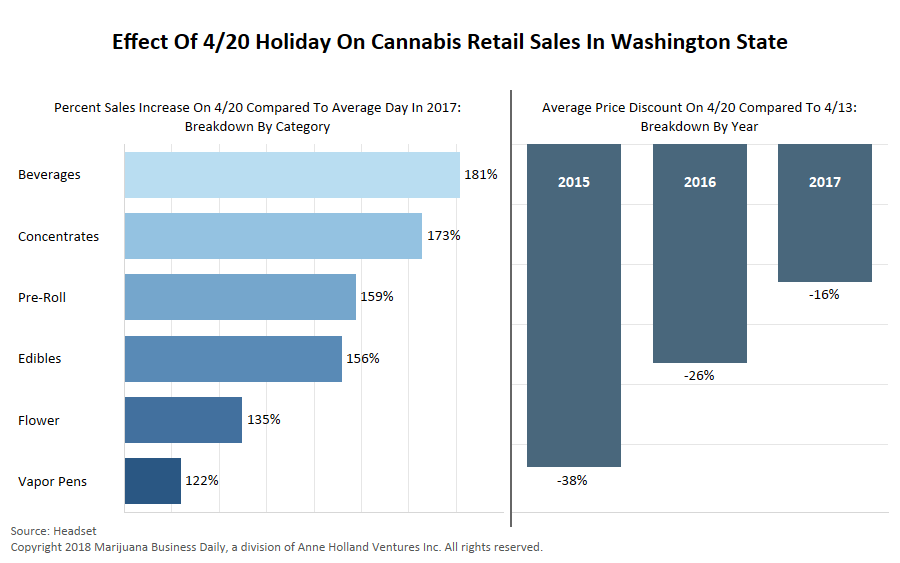Political support for reforming federal cannabis laws appears to be snowballing: Senate Majority Leader Mitch McConnell, Senate Minority Leader Chuck Schumer, President Donald Trump and former House Speaker John Boehner all recently signaled varying levels of support.
In short, a variety of pro-cannabis bills – from hemp legalization and tax reform to granting MJ businesses new protections from federal interference – are attracting a growing number of supporters from both sides of the political aisle in Congress.
Despite these promising developments, marijuana and hemp industry executives and investors may have to continue to live with uncertainty for a while – at least until after this fall’s midterm elections.
“Marijuana bills are pretty dead on arrival,” said John Hudak, a senior fellow at the Brookings Institution, a Washington DC think tank. “Before the election – I don’t think Congress has the appetite.”
Still, several historic developments have surfaced that could lead to major action down the road:
- McConnell, a Kentucky Republican, sponsored a hemp legalization bill that has been fast-tracked to the full Senate for debate.
- Schumer, a New York Democrat, announced plans to introduce comprehensive legislation to deschedule marijuana and allow states to legislate their own policies.
- Trump personally expressed support to Sen. Cory Gardner of Colorado for a states’ rights legislative approach. The Republican senator and Elizabeth Warren, a Massachusetts Democrat, are crafting a bipartisan bill separate from Schumer’s that would provide states with the authority to decide on marijuana laws for themselves.
- Boehner, a Republican, joined the board of a marijuana company and is calling for legalization and federal reform.
“Between Boehner and Schumer, it’s almost a watershed moment, I think,” said David Boyer, a legislative analyst at the Marijuana Policy Project.
Marijuana and hemp businesses would reap huge benefits from federal legislation that protects cannabis companies and eliminates the cloud of legal uncertainty overhanging the multibillion-dollar industry.
Less legal uncertainty could attract new investment dollars and inspire more states to legalize medical and adult-use cannabis, for example.
An overhaul of Section 280E of the federal tax code would benefit MJ companies’ bottom line by allowing them to deduct business expenses just as mainstream companies do now.
And full-fledged hemp legalization could expand the market for that crop.
Key stumbling block
Public support for legalizing marijuana has increased over the years and now exceeds six in 10 Americans, according to several polls. In 2000, slightly less than one in three favored legalization, according to Pew Research Center.
So what is holding back Congress from taking action?
“It’s very simple,” U.S. Rep. Tom Garrett, R-Virginia, said in a recent interview with Marijuana Business Daily. “There are a bunch of gatekeepers here that won’t let these bills get to the floor.”
Garrett last year introduced legislation to remove marijuana from the controlled substances list and leave regulation up to the states.
The Marijuana Leadership Campaign, a new advocacy group, blames Rep. Pete Sessions (no relation to U.S. Attorney General Jeff Sessions), a Texas Republican, for thwarting marijuana reform.
“As chair of the House Rules Committee, he has single-handedly blocked all good marijuana amendments from receiving votes on the House floor,” Rob Kampia, co-founder of the Marijuana Leadership Campaign and the former chief of MPP, wrote in an email to MJBizDaily.
Kampia’s group is forming political action committees to try to unseat Pete Sessions. The congressman’s office didn’t respond to a request for comment.
Odds favor hemp legislation
Among the cannabis-related bills, the effort to deschedule hemp and fully legalize its production and sales may be the most likely to pass.
Thanks to a procedural maneuver, McConnell’s bill, the Hemp Farming Act of 2018, leapfrogged over the committee process so that it can be brought up on the Senate floor.
But the move doesn’t mean the bill is assured of passage – or even getting a vote.
“Anytime a Senate leader introduces legislation, it increases the likelihood it passes,” said the Brookings’ Hudak. “But again, I think hemp policy is wrapped up into broader marijuana policy.
“Congress is not looking to taking anything big on. I’m skeptical McConnell would put his capital toward that.”
Below are among the key pieces of legislation that have been introduced in Congress. Still to be introduced are the bills being drafted by Schumer and Gardner.
Senate Bill 2667: Hemp Farming Act of 2018
Sponsor: Mitch McConnell; introduced April 12, 2018; 3 co-sponsors.
Goal: Remove hemp from the Controlled Substances Act and allow the plant to be grown and sold as an agricultural crop.
House Bill 5050: Sensible Enforcement of Cannabis Act
Sponsor: Luis Correa, California Democrat; introduced Feb. 15, 2018; three co-sponsors.
Goal: Prohibit the Justice Department from prosecuting people using medical or recreational marijuana in states where it is legal.
House Bill 4815: Marijuana Justice Act of 2018
Sponsor: Barbara Lee, California Democrat; introduced Jan. 17, 2018; 27 co-sponsors.
Companion to Senate Bill 1689: Marijuana Justice Act of 2017, sponsored by Cory Booker, a New Jersey Democrat.
Goal: Eliminate criminal penalties for people who import, export, manufacture and possess marijuana with the intent to distribute it.
House Bill 1810: Small Business Tax Equity Act of 2017
Sponsor: Carlos Curbelo, Florida Republican; introduced March 30, 2017; 43 co-sponsors (three new ones in 2018).
Goal: Amend the federal tax code to allow marijuana businesses in compliance with state laws to take business-related tax credits and expenses.
House Bill 1841: Regulate Marijuana Like Alcohol Act
Sponsor: Jared Polis, Colorado Democrat; introduced March 30, 2017; 24 co-sponsors (seven new ones in 2018).
Goal: Remove marijuana from regulation under the Controlled Substances Act.
House Bill 1227: Ending Federal Marijuana Prohibition Act of 2017
Sponsor: Tom Garrett; introduced Feb. 27, 2017; 33 co-sponsors (18 new ones in 2018).
Goal: Remove marijuana from the controlled substances list and leave legislation up to the states.
House Bill 975: Respect State Marijuana Laws Act of 2017
Sponsor: Dana Rohrabacher, California Republican; introduced Feb. 7, 2017; 45 co-sponsors (21 new ones in 2018).
Goal: Amend the Controlled Substances Act to remove penalties for people who produce, possess, distribute, dispense, administer or deliver marijuana in compliance with state laws.
Jeff Smith can be reached at jeffs@mjbizdaily.com




